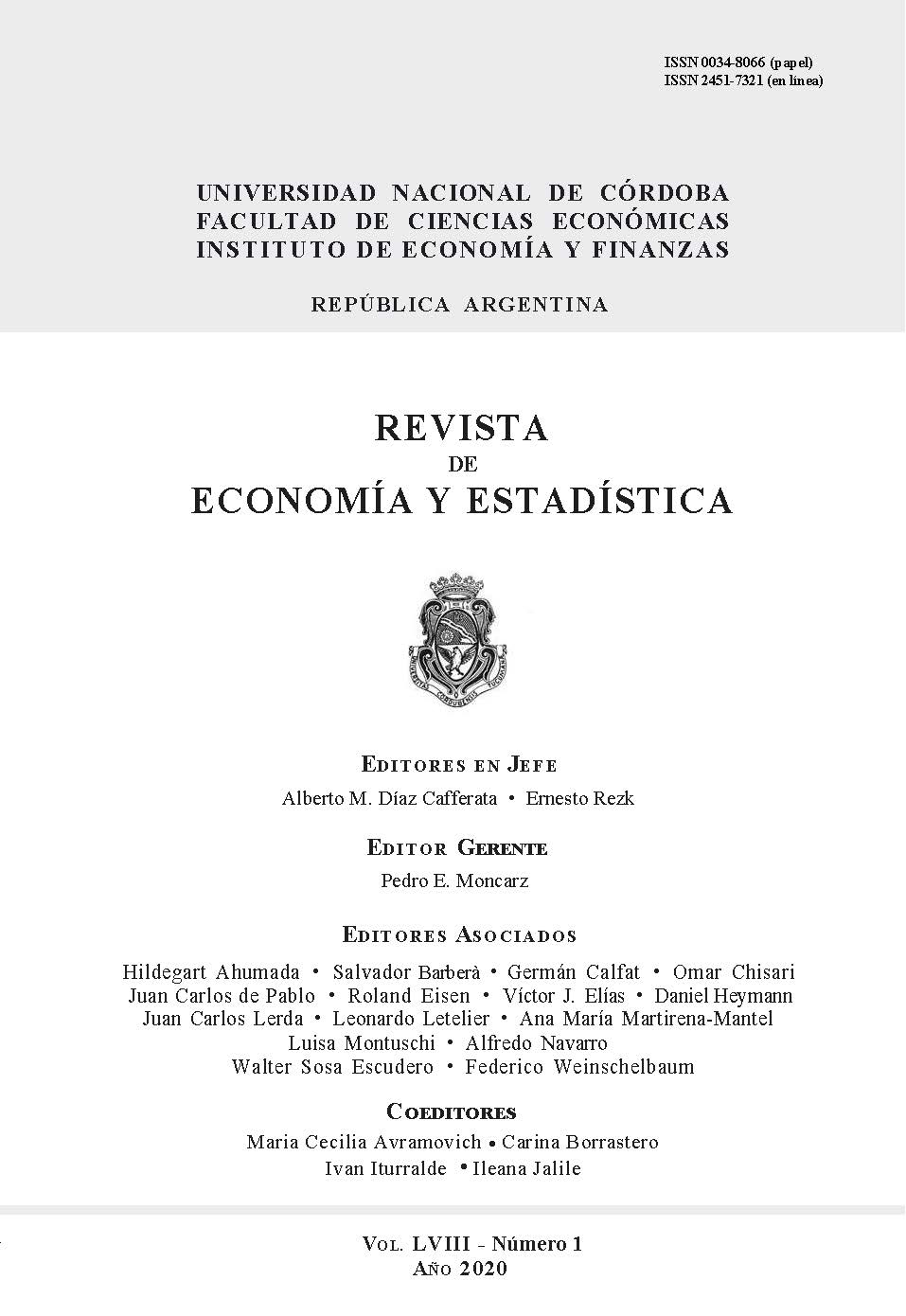How Specific is Latin America in a World of Contrasted Inequality Regimes?
DOI:
https://doi.org/10.55444/2451.7321.2020.v58.n1.31866Keywords:
inequality regimes, growth and equity, welfare and innovation systems, Latin AmericaAbstract
Three contemporary paradoxes regarding the trajectories of inequality in North America, Europe and Latin America deserve explanations. A common socioeconomic approach is proposed and applied, based upon the concept of inequality regimes. It is concluded that the regions do not follow the same trajectory, since they have developed contrasting inequality regimes that co-evolve and are largely complementary at the world level. In the early 2010s, the more inclusive Latin American economies were the outcome of the interaction between new domestic democratic advances and the dynamism of the international economy. The reversal of the world trade and of the terms of trade shows the fragility of this modest reduction in inequality.
Reception date: February 15, 2020
Acceptance date: May 5, 2020
Downloads
References
Aglietta, M. (1979). A Theory of Capitalist Regulation: The US Experience. Schocken Books.
Artus, P. (2009). Emprunt d’Etat Français. Priorités stratégiques & opportunités d’investissement. Flash Economie, 549.
Alvaredo, F., Chancel, L., Piketty, T., Saez, E. y Zucman, G. (2018). Rapport sur les inégalités mondiales. Le Seuil.
André, C. y Delorme, R. (1983) Matériaux pour une comparaison internationale des dépenses publiques. Statistiques et Etudes Financières, 390(1), 3-58.
Atkinson, A., Piketty, T. y Saez, E. (2011). Top Incomes in the Long Run of History. Journal of Economic Literature, 49(1), 3-71.
Blanchard, O. y Leigh, D. (2013). Growth Forecast Errors and Fiscal Multipliers. IMF Working Paper, 13, 1.
Boschi, R. (11 a 13 de Noviembre 2009). Estado desarrollista en Brasil. Crisis, continuidad, incertidumbres. Seminario Internacional Dimensiones sociopolíticas y económicas de la crisis en los países emergentes. Enfoque pluridisciplinario y comparativo a partir de México, Colegio de México.
Boyer, R. (1994). Do Labor Institutions Matter for Economic Development? A ‘Régulation’ Approach for the OECD and Latin America with an Extension to Asia. En G. Rodgers (Ed.), Workers, Institutions and Economic Growth in Asia, 25-112. ILO/ILLS.
Boyer, R. (2000). The French Welfare: An Institutional and Historical Analysis in European Perspective, CEPREMAP Working Papers (Couverture Orange), 2000-07.
Boyer, R. (2006). La flexicurité danoise. Quels enseignements pour la France?, Opuscule CEPREMAP, 2.
Boyer, R. (2011). A New Epoch but Still Diversity Within and Between Capitalism: China in Comparative Perspective. En Ch. Lane y G. T. Wood (Eds.), Capitalist Diversity and Diversity within Capitalism, 32- 68. Routledge.
Boyer, R. (2014). Is More Equality Possible in Latin America? A Challenge in a World of Contrasted but Interdependent Inequality Regimes. En desiguALdades.net Working Paper Series, 67, International Research Network on Interdependent Inequalities in Latin America.
Boyer, R. (2015). The welfare-innovation institutional complementarity: Making sense of Scandinavian history. En S. Borras y L. Seebrooke (Eds), Sources of National Institutional Competitiveness. Sense-making and institutional change, 129-147. Oxford University Press.
Boyer, R. (2016). Brexit: the day of reckoning for the neo-functionalist paradigm of European Union. Socio-Economic Review, Discussion Forum: "Brexit: understanding the socio-economic origins and consequences", 14(4), 836-845.
Boyer, R. y Saillard, Y. (2001). Regulation Theory: The State of Art. Routledge.
Boyer, R., Dehove, M. and Plihon, D. (2004). Les crises financières. Rapport du Conseil d’Analyse Economique, 50.
Boyer, R. y Neffa, J. C. (2004). La crisis argentina (1976-2001). Una visión desde la teorías institucionalistas y regulacionistas. Miño y Dávila.
Boyer, R. y Neffa, J. C. (2007). Salida de crisis y estrategias alternativas de desarrollo. La experiencia argentina. Miño y Dávila.
Bresser-Pereira, L. C. (2009). Pourquoi certains pays émergents réussissent et d’autres non. La Découverte.
CEPAL (2012). Cambio estructural para la igualdad. Una visión integrada del desarrollo. Naciones Unidas.
Crotty, J. y Epstein, G. (2008). The Costs and Contradictions of the Lender-of-Last Resort Function in Contemporary Capitalism: The Sub-Prime Crisis of 2007-2008. Working Paper Political Economy Research Institute (PERI), 2-3, University of Massachusetts.
Dosi, G. (2009). Schumpeter Meeting Keynes: A Policy Friendly Model of Endogenous Growth and Business Cycles. LEM Paper Series, 21, Santa Ana School of Economics.
Fagnani, E. (2013). Campo de Debate do PT: Qual foi a principal política social de Lula?. Jornal GGN, Recuperado de https://jornalggn.com.br/embates/campo-de-debate-do-pt-politica-social-pobreza-e-desigualdade/
Fellman, S., Iversen, J. M., Sjögren, H. y Thrue, L. (2008). Creating Nordic Capitalism: The Business History of A Competitive Periphery. Palgrave-MacMilan.
Fukuyama, F. (2012). The Future of History: Can Liberal Democracy Survive the Decline of the Middle Class. Foreign Affairs, 90(1), 56.
Galbraith, J. (2007). Global Inequality and Global Macro Economics. En D. Held y A. Kaya (Eds.), Global Inequality, 148- 175. Polity Press.
Galbraith, J. (2012). Inequality and Instability: A Study of the World Economy Just before the Great Crisis. Oxford University Press.
Gómez Sabaíni, J. C., Jiménez, J. P. y Rossignolo, D. (2011). Imposición a la renta personal y equidad en América Latina. Nuevos desafíos [Ponencia]. Tax Dialogue Global Conference on Tax and Inequality, Nueva Delhi, 7 al 9 de Diciembre.
Goñi, E., Lopez, J. H. y Serven, L. (2008). Fiscal Redistribution and Income Inequality in Latin America. Policy Research Working Paper 4487, World Bank.
Hausmann R., Rodrik, D. y Velasco, A. (2005). Growth Diagnostics. Unpublished manuscript, John F. Kennedy School of Government, Harvard University.
Jiménez, J. P. y López Azcúnaga, I. (2012). ¿Disminución de la desigualdad en América Latina? El rol de la política fiscal. desiguALdades.net Working Paper Series, 33, International Research Network on Interdependent Inequalities in Latin America.
Kuznets, S. (1955). Economic Growth and Income Inequality. The American Economic Review, 45(1), 1-28.
Milanovic, B. (2007). Globalization and Inequality. En D. Held y A. Kaya (Eds.), Global Inequality, 26-49. Polity Press.
Miotti, L., Quenan, C. y Torija Zane, E. (2012). Continuités et ruptures dans l’accumulation et la régulation en Amérique latine dans les années 2000: le cas de l’Argentine, du Brésil et du Chili. Revue de la regulation, 11.
Montagne, S. (2006). Les fonds de pension. Entre protection sociale et speculation. Odile Jacob.
Panigo, D. (2008). Volatilité macroéconomique et inégalité en Amérique Latine (Doctoral Thesis). EHESS, Paris.
Pedersen, O. (2008). Corporatism and Beyond: The Negotiated Economy. In J. Campbell, J. Hall y O. Pedersen (Eds.), National Identity and the Varieties of Capitalism: The Danish Experience, 245-270. DJOF Publishing.
Piketty, T. (2015). Le capital au XXI siècle. Le seuil.
Piketty, T. y Saez, E. (2003). Income Inequality in the United States, 1913-1998. Quarterly Journal of Economics, 118(1), 1-39.
Piketty, T. y Saez, E. (2007). How Progressive is the U.S. Federal Tax System? A Historical and International Perspective. Journal of Economic Perspectives, 21(1), 3-24.
Saboia, J. (2010). Elasticidades de rendimentos de trabalho em relação ao salario mínimo a experiência do período recente. Economia y Sociedades, 19, 359-380.
Schor, J. (1992). The Overworked American: The Unexpected Decline of Leisure. Basic Book.
Schultz, P. (2005). Fertility and Income. Yale University Economic Growth Center Discussion Paper, 925.
Telo, C. (2012). Sobre la desigualdad en México. UNAM-Facultad de Economía.
Théret, B. (1997). Méthodologie des comparaisons internationales une lecture régulationniste des systèmes de protection sociale. Revue de la Régulation, 1.
UNRISD (2010). Combating Poverty and Inequality: Structural Change, Social Policy and Politics. United Nations.
Wilkinson, R. y Pickett, K. (2010). The Spirit Level: Why Equality is Better for Everyone. Penguin Books.
Downloads
Published
Issue
Section
License
Copyright (c) 2020 Robert Boyer

This work is licensed under a Creative Commons Attribution-NonCommercial-NoDerivatives 4.0 International License.
Authors who have publications with this journal agree to the following terms:
Authors retain their copyright and grant the journal the right of first publication of their work, which is simultaneously subject to the Creative Commons Attribution-NonCommercial-NoDerivatives 4.0 International License that allows third parties to share the work provided that its author and first publication in this journal are indicated.
Authors may adopt other non-exclusive licensing arrangements for distribution of the published version of the work (e.g. depositing it in an institutional telematic archive or publishing it in a monographic volume) as long as the initial publication in this journal is indicated.
Authors are allowed and encouraged to disseminate their work via the Internet (e.g. in institutional telematic archives or on their website) before and during the submission process, which can lead to interesting exchanges and increase citations of the published work. (See The Open Access Effect)










